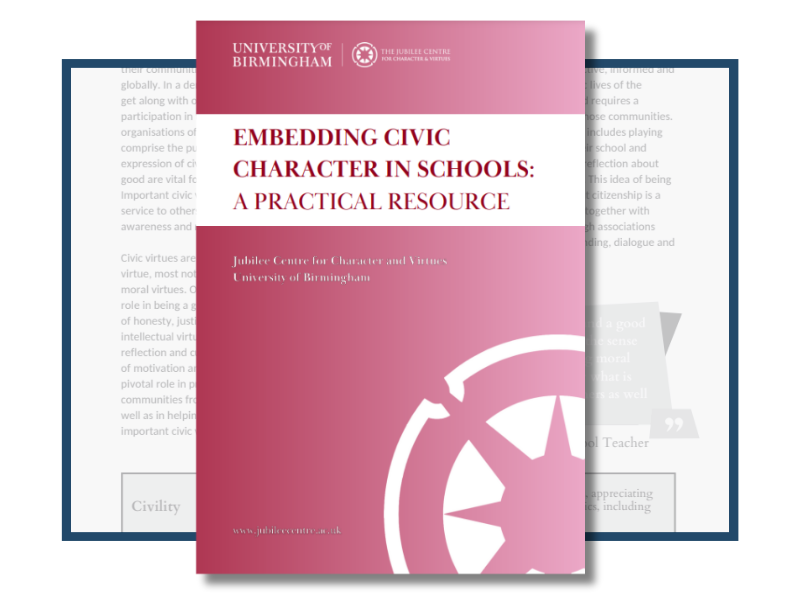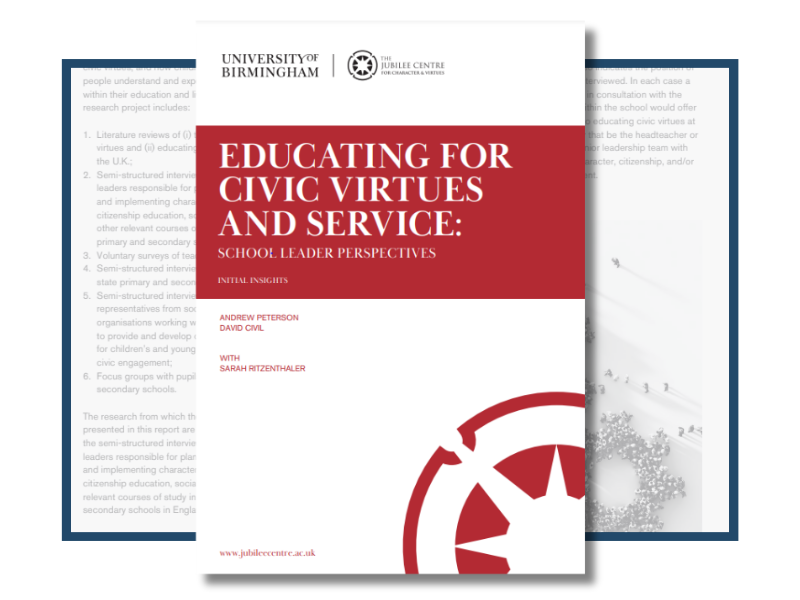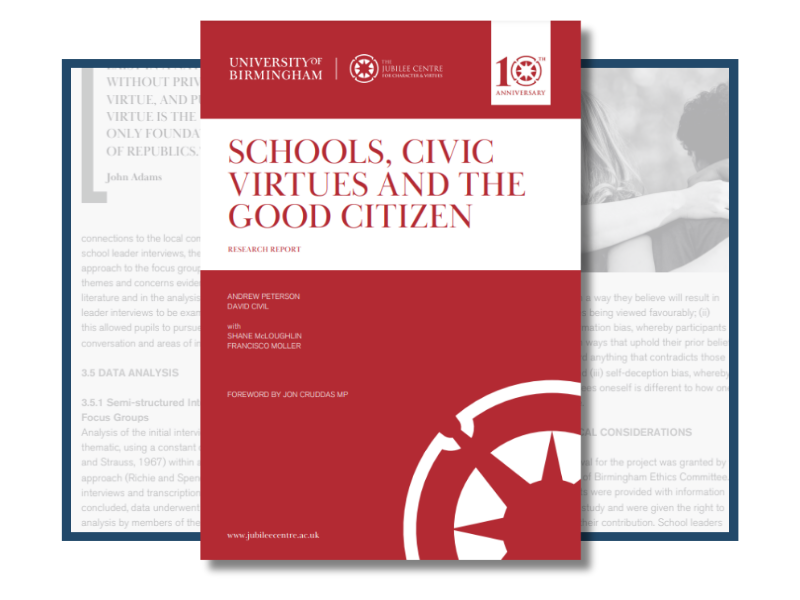Project Overview
The Civic Virtues Through Service to Others project draws from and extends the Centre’s work to date on civic virtue, service and youth social action. Using service as a prism for exploring civic virtues in young people’s lives the project examines the meaning of civic virtue in contemporary public life and education in the UK. The project comes at a time in which serious concerns have been raised about several core features of democratic life, both in the UK and elsewhere. Such concerns include increased political polarisation, a deterioration in the tone of political discussion and a decline in the commitment to the common good. These concerns notwithstanding, various studies, including previous studies conducted by the Jubilee Centre, offer a more hopeful and positive picture of young people’s civic commitments and engagements.
Embedding Civic Character in Schools: A Practical Resource
Embedding Civic Character in Schools: A Practical Resource Focuses on a caught, taught and sought approach to civic character, the resource builds on the Centre’s research on ‘Civic Virtues Through Service to Others’. This research has particular focus on civic virtues and character education and how it can be utilised more widely to support school leaders, teachers, governors, and other stakeholders to educate all pupils for good citizenship as part of a schools’ character education provision.

Educating for Civic Virtues and Service: School Leader Perspectives
The Educating for Civic Virtues and Service: School Leader Perspectives Initial Insights report was published on 15th November 2021. This report explores school leaders’ perspectives on civic virtues and service and presents findings from interviews conducted with school leaders from across the U.K. The report captures how schools with an embedded approach to character education have a core commitment to cultivate civic virtues, as well as the importance of the local community as a space for pupils to practice and develop these virtues. The findings from this research will inform the second phase of the project, which will include a nationwide pupil survey about civic virtues, active citizenship and service.

Schools, Civic Virtues and the Good Citizen
Schools, Civic Virtues and the Good Citizen examined the meaning of civic virtue in contemporary public life and education in the UK.
This research report presents data examining how school leaders, teachers and pupils understand and experience educating for civic virtues, as well as how they understand the virtues of a good citizen.
Building on this, the report outlines how schools might then help to build a generation of virtuous citizens, mapping out a route to civic renewal based on firm empirical foundations.

Key findings:
- School leaders viewed preparing pupils to be good citizens to be a core and important part of education and schooling.
- Schools provided a range of opportunities for pupils to engage in civil activities, the extent and universality of these was not uniform.
- Teachers perceived the teaching of all categories of virtues – including civic virtues – to be very important.
- Intellectual, moral, civic and performance virtues were all considered to be important for being a good citizen – but particular emphasis was placed on moral virtues, viewing these as both central to good citizenship and as foundational for developing civic virtues.
- Where school leaders, teachers and pupils perceived a very close relationship between the good person and the good citizen, the reasons given focussed on either the mutual connection of these virtues and/or on the idea that being a good person acts as a precursor for being a good citizen.
- Though still regarding intellectual virtues as important for being a good citizen, teachers and pupils viewed them as less important than moral, civic and performance virtues in that regard.
Key Recommendations:
Report makes five main recommendations about education for good citizenship and civic virtues in schools today:
- Those involved in developing policy and practice in school should focus their attention on how civic virtues are cultivated within and beyond school settings.
- Schools should ensure not only that they have an explicit set of virtues that are embedded across the school community, but that these include civic virtues.
- Those engaged with policy at all educational levels should consider how closer and more holistic connections can be made between character education and education for citizenship.
- More empirical research is needed to examine further the relationship among embedded character education in a school, pupils’ sense of belonging to the school community and pupils’ sense of belonging to the local community.
- More theoretical and empirical research is needed that explores the role and importance of intellectual virtues to being a good citizen, including the meta-virtues of phronesis at both the individual and collective levels.
On 16th November 2022 the Jubilee Centre hosted a dinner titled ‘Common Ground for the Common Good’ at the Athenaeum Club, Pall Mall.
Welcoming politicians, charity leaders, journalists, headteachers, and noted academic thinkers in the field, the evening of dinner and discussion offered a culmination to the ‘Civic Virtue and the Common Good’ webinar series which the Centre has convened since September 2021. While a diversity of views were present and were expressed, those attending the meal were agreed on the need for the state, market and wider society to be more explicit about the role of society and key institutions as centres of moral, intellectual and civic formation – a role that needs to be animated by a vison of the common good and the good life.
The Centre and its partners will continue to come together to discuss these ideas and to continue to advocate for the importance of character, civic virtue and the common good for societal and human flourishing. The conversations at the dinner drew upon this discussion paper shared with guests in advance of the evening and built on the findings of the recently published research report Schools, Civic Virtues and the Good Citizen, which is available here.
‘Common Ground for the Common Good’ Dinner – 16th November 2022
On 16th November 2022 the Jubilee Centre hosted a dinner titled ‘Common Ground for the Common Good’ at the Athenaeum Club, Pall Mall.
Welcoming politicians, charity leaders, journalists, headteachers, and noted academic thinkers in the field, the evening of dinner and discussion offered a culmination to the ‘Civic Virtue and the Common Good’ webinar series which the Centre has convened since September 2021. While a diversity of views were present and were expressed, those attending the meal were agreed on the need for the state, market and wider society to be more explicit about the role of society and key institutions as centres of moral, intellectual and civic formation – a role that needs to be animated by a vison of the common good and the good life.
The Centre and its partners will continue to come together to discuss these ideas and to continue to advocate for the importance of character, civic virtue and the common good for societal and human flourishing. The conversations at the dinner drew upon this discussion paper shared with guests in advance of the evening and built on the findings of the recently published research report Schools, Civic Virtues and the Good Citizen, which is available here.
Civic Virtue, Devolving Power and Empowering Citizens – Tuesday 18 October 2022
The fourth session in the Jubilee Centre’s Civic Virtue and the Common Good’ webinar series, ‘Civic Virtue, Devolving Power and Empowering Citizens’ welcomed
- Imogen Sinclair, Director of the New Social Covenant Unit
- Kim Leadbeater MBE MP, More In Common Batley and Spen Ambassador and Member of Parliament for Batley and Spen
Hosted by Senior Centre Research Fellow Lord James O’Shaughnessy this session discussed how to identify, celebrate and extend those aspects of devolution that make democratic renewal and greater citizen participation truly possible, while at the same time ensuring that policies and structures are sensitive to the character and particular local needs of all citizens.
A position paper shared with the speakers, outlining the topics considered and questions still to be addressed in this area can be found on the Jubilee Centre Blog Site, Virtue Insight – https://virtueinsight.wordpress.com/2022/10/14/civic-virtue-devolving-power-and-empowering-citizens/
Civic Virtues, Formative Institutions, And Flourishing Communities Webinar – Tuesday 5 July 2022
The Third in a series of public webinars considering Civic Virtue and the Common Good, in July 2022 the Centre hosted ‘Civic Virtues, Formative Institutions, And Flourishing Communities’ welcomed:
- Jesse Norman MP (Hereford and South Herefordshire)
- Professor John Denham PC (Director,Centre for English Identity and Politics & the Southern Policy Centre)
Chaired by Senior Centre Research Fellow, Lord James O’Shaughnessy, through presentations and together in discussion the panel considered a number of important questions.
- In order to foster civic virtues and underpin the common good, in what way do existing institutions have to change? Do we require new institutions? How might these institutions be successfully embedded into local and national life?
- What is the role of the state in developing the civic virtues of its citizens? What role do state institutions play in sustaining flourishing communities and how do, and should, these institutions relate to non-state organisations?
- What existing practices and examples are available that provide clear examples of flourishing organisations and communities that illustrate a productive role of/for the state?
- What are the obstacles or barriers to building formative institutions that bring citizens together, enable them to exercise civic virtue, and help communities to flourish? How might these challenges be overcome?
A recording of this session is available below.
Civic Virtue, Service and the Voluntary Spirit Webinar – Tuesday 18 January 2022
The second in a series of public webinars considering Civic Virtue and the Common Good, in January 2022 the Centre hosted ‘Civic Virtue, Service and The Voluntary Spirit’ welcomed:
- Rushanara Ali MP (Bethnal Green and Bow)
- Danny Kruger MP (Devizes)
- Helen Goulden, Chief Executive Officer of The Young Foundation.
Chaired by Senior Centre Research Fellow, Lord James O’Shaughnessy, through presentations and together in discussion the panel considered a number of important questions.
- What is the role of the state in facilitating and enabling a voluntary spirit?
- How can we capitalise on the upsurge in social action and community-mindedness witnessed during the Covid-19 pandemic?
- How can specific contextual features of local communities be recognised and supported in any endeavours to build the voluntary spirit?
- What are the obstacles or barriers to civic engagement, including that of young people? How might these challenges be overcome?
A position paper outlining these questions in more detail can be read here.
Civic Virtue, Community and the Common Good Webinar – Monday 20 September 2021
As part of the ongoing project the centre hosted a public webinar in September 2021 tittled Civic Virtue, Community and The Common Good. This session welcomed:
- Jason Cowley, Editor of the New Statesman,
- Miriam Cates, Conservative MP for Penistone and Stocksbridge
- Jon Cruddas, Labour MP for Dagenham and Rainham and Author of ‘The Dignity of Labour’
First individually and then together as a panel these speakers evaluated the status of common good politics in Britain today, considering the barriers posed by an increasingly polarised and intolerant political debate, as well as the signs of hope of communities coming together witnessed over the course of the Covid-19 pandemic.
Chaired by UK Life Peer and Senior Centre Research Fellow, Lord James O’Shaughnessy, the speakers considered how the common good can be promoted in British politics through an emphasis on civic virtues, mutual aid and a positive vision of social justice which places the good of communities and human flourishing at its core.
A recording of this session is available below and the position paper which accompanies this webinar, presented as part of the Centre’s Virtue Insight blog series, can be found here.
Publications
Journal Articles
Published in February 2022 in the journal Educational Review, Professor Andrew Peterson and Dr. David Civil analyse the fracturing of civic and moral virtue within curricular policies pertaining to Citizenship in England since the late 1990s.
Previous Reports
The Building Character Through Youth Social Action report presents findings from research carried out with youth social action providers and young people between March and December 2014. The research explored how youth social action providers aim to build young people’s character and demonstrates the significant, positive impact that providers believe social action has on a young person’s character, and in turn the impact of that character development on young people and society.
The A Habit of Service report published in 2017 presents the findings of the largest known study of its kind and reports on evidence gathered from over 4,500 16-20 year olds about the factors that are associated with young people who have made a habit of service.
Virtual Exhibition
The ‘Character, Service and Civic Virtue: Celebrating the Double Benefit’ exhibition explores the Centre’s work in the field of youth social action. The exhibition reflects on research in to ‘the double benefit’, showcases the impact and legacy of the Step Up to Serve partnership, and celebrates the variety of engagements which the Centre has coordinated to help realise the benefits of service for young people.
Statements
Published in 2014 the Statement on Youth Social Action and Character Development sets out the ways in which youth social action is an effective and meaningful way to develop young people’s character virtues.
Published in 2019 the Statement on Civic Virtues in the Public Domain affirms the importance of civic life and in democratic society.
Insight Papers
Meritocracy and the Common Good – David Civil
– In this Insight Paper, David Civil analyses two recent critiques of the concept of meritocracy from the philosopher Michael Sandel and the political commentator David Goodhart. The paper explores how meritocracy created or exacerbated a wide range of contemporary ills, from the rise of populism to the erosion of the common good.
Civic Friendship – Randall Curren and Laura Elenbaas
– As part of the Jubilee Centre’s Insight Paper series, Randall Curren and Laura Elenbaas analyse the concept of friendship in Aristotelian philosophy. Drawing on inter-group contact theory, the authors show that civic friendships can be enhanced across a variety of identity group divides.
(Good) Hope as an Intellectual and Civic Virtue of the Imagination – Alessandra Tanesini
– In this Jubilee Centre Insight Paper, Alessandra Tanesini explores the importance of hope and argues it should be considered an intellectual and civic virtue of the imagination. Tanesini argues that hope, when good, is an intellectual virtue of the imagination that is crucial to learning and serves to bring communities together.
Service and Youth Social Action: Reflections on Jubilee Centre Studies to Date – Andrew Peterson and Sarah Ritzenthaler
– Andrew Peterson and Sarah Ritzenthaler outline Jubilee Centre findings to date on Youth Social Action and analyse the concept of service at the heart of this process. Centre research highlights the ‘double benefit’ of social action but demonstrates how the balance between the benefits to the individual and those that accrue to the community can become skewed.
Citizens’ Relationships, Political Civility and the Virtue of Listening – Nancy Snow
– In this Insight Paper, Nancy Snow explores what political civility is, and whether and how it can be attained in contemporary political life. Snow argues that political civility can be recovered and nurtured by supplementation with the civic virtue of listening.

